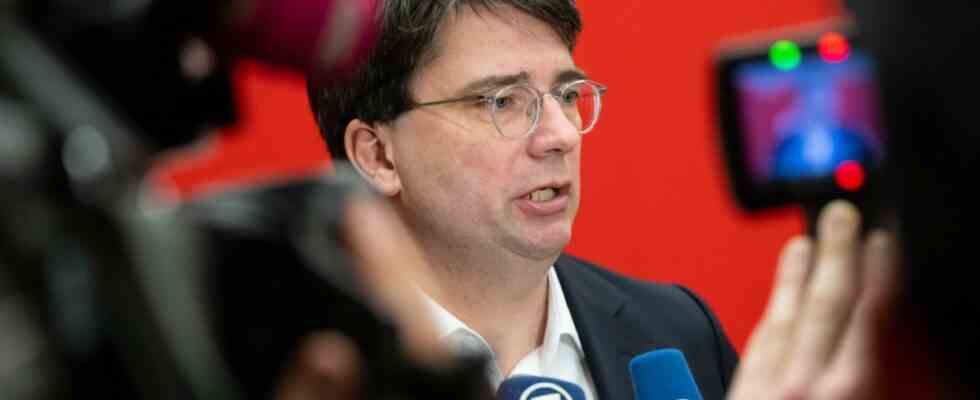So now it is. Education policy – specifically the shortage of teachers in schools – could be a hit in the election campaign this year. The SPD parliamentary group devoted itself to the topic on Thursday at the end of its three-day winter retreat. Simone Fleischmann, President of the Bavarian Teachers’ Association (BLLV), was a guest.
When the Social Democrats sent out their program at the beginning of the year, the situation looked different. In the BR24 Bavarian trend, people in Bavaria were asked about the problems that they felt needed to be solved as a matter of urgency – and the school sector, which is actually always a source of excitement as a classic state competence, ended up somewhere in the lower ranks; minus eight percentage points on previous surveys. In the 2018 election year, this complex was still the second most important for the citizens. At the forefront of the most important issues were energy policy and migration.
If it wasn’t for Markus Söder. At the meeting of the CSU parliamentary group in Kloster Banz on Wednesday, the prime minister made it clear that he also intends to go into the election campaign with school politics. He promised that he would create 6,000 new teaching posts by 2028 if he wanted to continue governing with the Free Voters; also 2000 more jobs for social workers, psychologists and school administrators. And Söder announced that the Free State wanted to poach teachers from other federal states much more offensively, for example with relocation assistance and financial incentives.
Suddenly school politics is back on everyone’s lips. So the SPD had the right instincts. No wonder, parliamentary group leader Florian von Brunn suggests on Thursday: Educational justice, for which the best possible conditions are needed, is a core issue of the SPD, they don’t want “success in life to depend on the coincidence of birth and the parents’ wallets”. The “positive thing about yesterday” – Brunn means the exam of the CSU – is that Söder “for the first time” admitted the need for teachers in Bavaria instead of downplaying it. Poaching people from other countries, on the other hand, “won’t be that easy” and was “not very solidary” – that wouldn’t be met with enthusiasm in the other federal states. When Brunn said that, the outcry had already erupted in many school ministries across the Federal Republic, as expected, and there was talk of “cannibalism.”
Simone Strohmayr, education policy spokeswoman for the SPD parliamentary group, said the CSU initiative illustrated “the enormous failures of the government factions” in personnel planning over the years. She referred to an expert opinion, according to which there is currently a shortage of 4,000 teachers in the Free State; this will continue to grow significantly year after year due to the increasing number of students and additional tasks – Söder’s new recruitment plan is, accordingly, not the big hit.
It is therefore important to create study places in one’s own federal state and to enable the universities to provide good teaching; Furthermore, according to Strohmayr, the teaching profession must become more attractive: in addition to the payment, for example, through the regular use of multi-professional teams in the classroom. After all, this is a huge relief in everyday school life. What is meant by this is that there is not just one teacher in the class, but social workers, educators, learning trainers or integration helpers work in the room as required.
BLLV boss Fleischmann believes that school will still be a campaign issue. Or she hopes so, so the impression. That’s why she came to the exam, she wanted “to use every stage to put education at the center of society”. The day before when the news from Kloster Banz was published, Fleischmann told the SZ: “A prime minister who doesn’t deny the shortage of teachers, but honestly addresses it and wants to solve it, first of all deserves respect.” But all of this is still just a project, the exciting question is how this number of new colleagues actually came to Bavaria’s schools.
BLLV boss Simone Fleischmann was a guest at the SPD parliamentary group.
(Photo: BLLV)
Individual support, said Fleischmann now in the SPD, should not only appear in “beautiful Sunday speeches”. Unfortunately, teachers often find that they cannot offer what children need. And because of the shortage of teachers, there is already a “string concert” in the timetable in many places, initially with music, sports and working groups. More focus must be placed on the middle school, the former Hauptschule, when it comes to staff: “The weakest need the best.”
All other factions have also commented on Söder’s initiative and the lack of teachers. Katharina Schulze (Greens) called the poaching offensive “pure window dressing. Because there is a shortage of teachers all over Germany, not just in Bavaria”. Simpler recognition procedures for teachers with foreign qualifications are needed, regardless of their country of origin. Ulrich Singer (AfD) explained that the teaching profession was also unattractive because “climate ideology” and the like had to be spread in schools instead of raising children to be “people rooted in their homeland and culture”.
Matthias Fischbach (FDP) sees teacher training as “outdated” and that schools also need “their own budgets with financial and educational freedom”. Tobias Gotthardt (FW), from whose group Minister of Education Michael Piazolo comes, praised “our declaration of war on the shortage of teachers and the nationwide recruitment for the best educational location in Germany”. This feat of strength requires a “state-of-the-art recruiting policy based on the model of the free economy,” the likes of which have never been seen before in Salvatorstrasse, the ministry’s headquarters.

